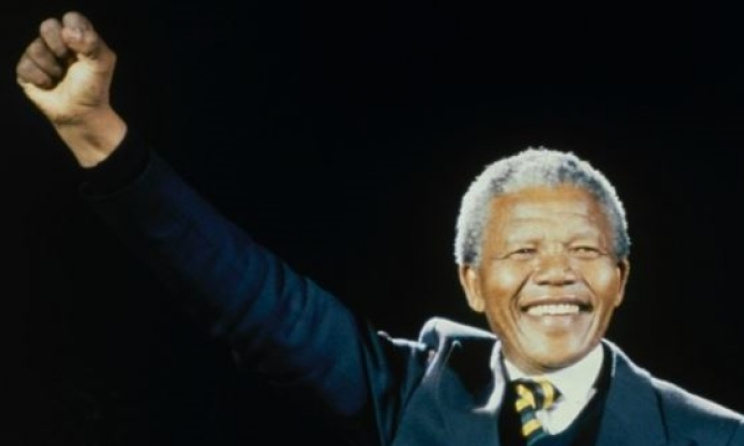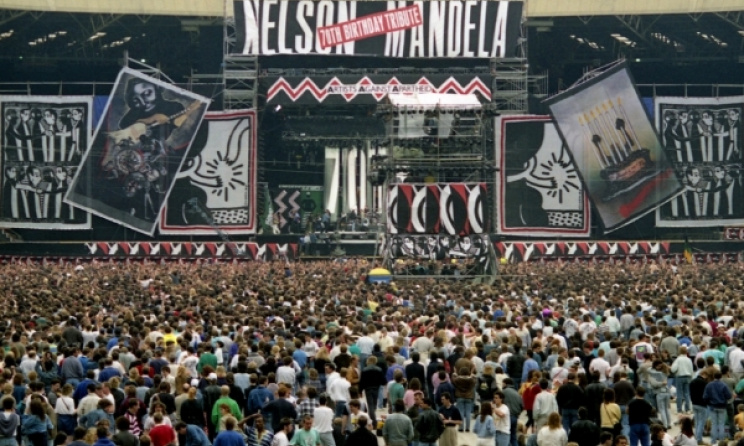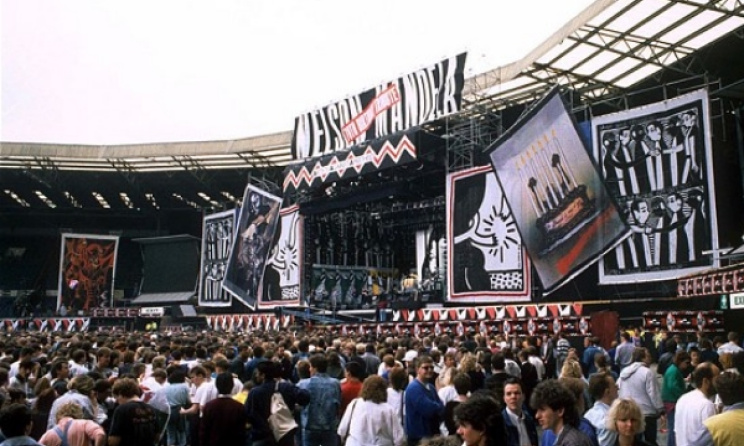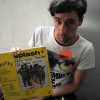‘One Humanity’ tells story of landmark Mandela concerts
 Nelson Mandela at the International Tribute to a Free SA in 1990. Photo: www.onehumanityfilm.com
Nelson Mandela at the International Tribute to a Free SA in 1990. Photo: www.onehumanityfilm.com A scene from the 70th birthday tribute in 1988. Photo: www.lenouvelliste.ch
A scene from the 70th birthday tribute in 1988. Photo: www.lenouvelliste.ch A scene from the 70th birthday tribute in 1988. Photo: telegraph.co.uk
A scene from the 70th birthday tribute in 1988. Photo: telegraph.co.uk
The 1980s was a time when popular music and politics collided all over the world. It was the era of huge concerts staged to raise funds and awareness for particular political causes. These concerts, which American musicologist Reebee Garofalo called “mega-events”, used popular music to conscientise and mobilise people around a specific political cause.
The concerts began in 1970s with events such as the Concert For Bangladesh (1971), Rock Against Racism (1977) and Musicians United for Safe Energy (MUSE)’s live triple album No Nukes: The Muse Concerts For a Non-Nuclear Future (1979). During the 1980s these concerts grew even larger, while star-studded collaborative recording projects were also set up with a similar goal. These included Band Aid’s single ‘Do They Know It’s Christmas?’ in 1984 (and again in 1989) and the Live Aid concerts in the UK and USA in July 1985 to raise funds and awareness for famine victims in Ethiopia. It was followed soon after in the USA by the similar supergroup USA for Africa’s ‘We Are The World’ – also for African famine relief – and the Farm Aid concert in September 1985 to raise money for American farmers. Later in the decade, the Amnesty International Human Rights Now! Tour in 1988 attempted to raise awareness for the UN’s Universal Declaration of Human Rights on its 40th anniversary.
Among the most prominent and popular of these political causes was the fight against apartheid in South Africa. The second half of the 1980s saw three major concerts held in the UK, all in the name of raising awareness for the struggle against apartheid. The first, known as Freedom Beat, took place in summer 1986 and attracted an audience of 200 000 to Clapham Common in London. It paved the way for two more massive concerts at Wembley Stadium in London, both held in honour of struggle leader Nelson Mandela. These two concerts are the subject of a fascinating new documentary film, entitled One Humanity.
The concerts
The Nelson Mandela 70th Birthday Tribute on 11 June 1988 attracted some 72 000 music fans to the live event. More significantly, it was broadcast whole or in part to an estimated 600 million people in over 60 countries. This time the concert was not billed as a general anti-apartheid event, but rather to celebrate the 70th birthday (on 18 July 1988) of Nelson Mandela and to call for his release from jail. The line-up of the Mandela Birthday Tribute included Dire Straits, Simple Minds, George Michael, Tracy Chapman, Whitney Houston, the Bee Gees, Eric Clapton, Stevie Wonder, Salt-n-Pepa, the Eurythmics and reggae acts Aswad, Sly and Robbie and UB40. South African acts included exiled stars Miriam Makeba, Hugh Masekela and Jonathan Butler, and locally-based Amampondo and Mahlathini & The Mahotella Queens.
The concert eventually distributed over $1 million to six charitable organisations chosen by anti-apartheid leader Bishop Trevor Huddleston. The success of the event and the calibre of the artists involved was proof of the power of the international anti-apartheid movement. This was made more remarkable by the fact that the event was held at a time when the government of the country hosting it, as well as those of several countries where it was broadcast, had still not officially endorsed the ANC, which was still officially banned in South Africa. This Cold War contradiction is something the film focuses on.
Two years later, on 16 April 1990, the International Tribute for a Free South Africa, also at Wembley Stadium, celebrated the recent release of Nelson Mandela with another star-studded line-up of artists. The 72 000 tickets for the concert sold out faster than for any other event in the history of Wembley and broadcasters in some 63 countries signed on to broadcast the four-hour concert.
Nelson Mandela, released from prison just months earlier, attended the event and delivered a moving speech between the musical acts. He told the musicians backstage: “Over the years in prison I have tried to follow the developments in progressive music… Your contribution has given us tremendous inspiration… Your message can reach quarters not necessarily interested in politics, so that the message can go further than we politicians can push it… We admire you, we respect you and above all, we love you.”
The documentary
Today the story of these incredible concerts, and the role of the international anti-apartheid movement in the struggle for democracy in South Africa, risks being forgotten as a younger generation grow up in a very different environment. To celebrate the legacy, One Humanity tells the story of how the world came to focus on a single cause - ending apartheid in South Africa - and the role played in this by two star-studded global TV broadcasts made in the name of Nelson Mandela in 1988 and 1990. The documentary consists mainly of interviews with musicians involved in the concerts, as well as key figures in the anti-apartheid struggle both in South Africa and the UK, along with highlights from the concerts.
The movie premiered in April 2014 at the Atterbury Theatre in Pretoria and the British Academy of Television Arts in London. Since then it has been screened several times on SABC TV in South Africa. It was recently screened at the Bioscope independent cinema in Johannesburg’s downtown Maboneng Precinct. In attendance was Tony Hollingsworth, the producer of the film and a central figure in the original concerts themselves, as well as director Mickey Madoda Dube and co-producer Dan Jawitz. After the screening the trio were on hand to answer questions from the audience and explain more about the film.
Discussing the process of putting together the film, Hollingsworth explained that he had wanted to make the film for some time, but with the help of South African minister Collins Chabane (who sadly passed away earlier this year) on the 20th anniversary of South Africa’s democracy, decided that now was the right time to make this film.
Hollingsworth heaped praise on the director Mickey Dube for piecing together such a complicated story in a way that was informative but still emotional and entertaining. “I interviewed a number of directors in South Africa,” he said. “The thing I was very impressed with by Mickey from those early conversations is that he’s able to grasp the back story and those narratives. He’s not afraid of running with those emotions. A lot of documentary makers only want to document, but there’s also a lot of emotions.”
Faced with hours and hours of concert and interview footage, Dube certainly had his work cut out for him in the editing room. Hollingsworth continued: “Mickey had to grab 20 seconds here, 10 seconds there, one second here, and put it all together to tell a story. That’s one of the successes here… In a way, none of it sort of resolves in literal fashion, but it resolves in an emotional fashion. That’s the celluloid tapestry that we’ve made… It’s very clever, these little things, how he puts them together. All the forces that were against apartheid and all the forces that were for apartheid - that Cold War story, which hasn’t been told before. So he put it together, and sometimes used it to drive the story, and sometimes use it to catch the emotions…It’s fantastic, he pulled it all together.”
Dube himself had this to say: “It was a lot of work, there’s no doubt about it. I think the whole making of the film was nine months long. That was the period of production. But the actual making was a month of shooting and three months of editing, so about four months in total.
“You get into literally subconscious mode,” explained Dube. “For me the most important thing for my style from a directorial point of view was to internalize the story. To say, I know the main story I want to tell was of the international solidarity movement, but I have these elements: I have Tony’s storyline, I have the music, I have the interviews with the people who were in the concert, then I have the interviews of those who were involved in the politics, on the South Africa side and the British side. So how do you weave them, basically.
“For me it was a great journey of re-discovering really and truly what happened,” continued the director. “Having been here in South Africa, you get one side of the story, but suddenly I discovered the other side. Tony’s story of the making of the concert has a context, a global broadcast that had so many political explosions in itself that it became no longer about the music but about the difficulties of the journey of the international solidary movement. So all of those things for me became narratives I could use to tell the real story… None of those stories individually tell the full story. It is together, all of them, that they do. So it was literally this weaving, this journey.”
The BBC will distribute a two-DVD box set - one of the film, the other of concert highlights featuring about 38 tracks. Proceeds from the film go to to the Nelson Mandela’s Children’s Fund, and the Nelson Mandela Children’ Hospital in Johannesburg, the Eric and Charmaine Mabuza Scholarship Foundation and the Nelson Mandela Foundation
For more details visit the film’s website or view the trailer below.




































Comments
Log in or register to post comments